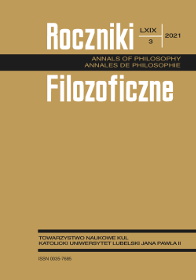The Theology of Hiddenness: J. L. Schellenberg, Divine Hiddenness, and the Role of Theology
Abstract
The paper explores Pascal’s idea according to which the teachings of the Church assume the hiddenness of God, and, hence, there is nothing surprising in the fact of the occurrence of nonresistant nonbelief. In order to show it the paper invokes the doctrines of the Incarnation, the Church as the Body of Christ, and the Original Sin. The first one indicates that there could be greater than nonbelief obstacle in forming interpersonal bonds with God, namely the ontological chasm between him and human persons. The assumption of the human nature by the Son of God could be seen as a cure for this problem. The doctrine of the Church shows it as an end in itself, and in order for the Church to have meaning and to exist there has to be nonbelief in the world. Finally, the dogma of the Original Sin shows that there is no category of purely nonresistant nonbelief. The paper also addresses Schellenberg’s “accommodationist strategy” from the perspective of the Christian theology and in the last part it investigates what should be the influence of the fact of the hiddenness on theology’s take on the divine revelation.
References
Aquinas, Thomas. On the Power of God. Translated by the English Dominican Fathers. Westminster, MD: Newman Press, 1952 [reprint from 1932]. Accessed March 27, 2021. https://isidore.co/aquinas/english/QDdePotentia.htm#1:5].
Aquinas, Thomas. Summa contra gentiles. Translated by Joseph Rickaby. Catholic Primer, 2005. Accessed March 27, 2021. https://anucs.weblogs.anu.edu.au/files/2013/11/St.-Thomas-Aquinas-The-Summa-Contra-Gentiles.pdf.
Athanasius. On the Incarnation. Translated by John Behr. Yonkers, NY: St. Vladimir’s Seminary Press, 2011.
Augustine. On Christian Teaching. Translated by R. P. H. Green. Oxford: Oxford University Press, 2011.
Barth, Karl. Church Dogmatics. Vol. 2, The Doctrine of God, edited by Geoffrey W. Bromiley and Thomas F. Torrance. Edinburgh: Clarke, 1957.
Barth, Karl. Dogmatics in Outline. New York: Harper & Row, 1959.
Calvin, John. Institutes of the Christian Religion. The Library of Christian Classics 20–21. Translated by F. Lewis Battles. Philadelphia: Westminster Press, 1966.
Cuneo, Terrence. “Another Look at Divine Hiddenness.” Religious Studies 49, no. 2 (2013): 151–64. https://doi.org/10.1017/s0034412513000048.
Drange, Theodore. Nonbelief and Evil. New York: Prometheus Books, 1998.
Fee, Gordon. The First Epistle to the Corinthians. Grand Rapids, MI: Eerdmans, 2014.
Gerrish, Brian. “‘To the Unknown God’: Luther and Calvin on the Hiddenness of God.” Journal of Religion 53, no. 3 (1973): 263–93.
Green, Adam, and Eleonore Stump, eds. Hidden Divinity and Religious Belief. New Perspectives. Cambridge: Cambridge University Press, 2015.
Haight, Mary. A Study of Self-Deception. Atlantic Highlands, NJ: Humanities Press, 1980.
Hepburn, Ronald. “From World to God.” Mind 72, no. 285 (1963): 40–50. https://doi.org/10.1093/mind/LXXII.285.40.
Howard-Snyder, Daniel, and Frances Howard-Snyder. “How an Unsurpassable Being Can Create a Surpassable World.” Faith and Philosophy 11, no. 2 (1994): 260–68. https://doi.org/10.5840/faithphil199411222.
John Paul II. Crossing the Threshold of Hope. Translated by Jenny McPhee and Martha McPhee. London: Jonathan Cape, 1994.
Keener, Craig. The IVP Bible Background Commentary New Testament. Downers Grove, IL: IVP Academic, 2014.
Kipp, David. “On Self-Deception.” Philosophical Quarterly 30, no. 121 (1980): 305–17. https://doi.org/10.2307/2219524.
Leibniz, Georg Wilhelm. Theodicy. Translated by E. M. Huggard. La Salle, IL: Open Court, 1985.
Luther, Martin. Martin Luther: Selections from His Writings. Edited by John Dillenberger. New York: Anchor Books, 1962.
McGinnis, Jon. “Divine Love in Medieval Islamic Lands.” In Green and Stump, Hidden Divinity and Religious Belief, 157–74.
Pascal, Blaise. Pensées. Translated by W. F. Trotter. Accessed March 27, 2021. http://www.ccel.org/ccel/pascal/pensees.html (Christian Classics Ethereal Library).
Paulson, Steven. “Luther on the Hidden God.” Word & World 19, no. 4 (1999): 363–71.
Penelhum, Terence. God and Skepticism. Dordrecht: Reidel, 1983.
Placher, William. The Domestication of Transcendence: How Modern Thinking about God Went Wrong. Louisville: Westminster John Knox Press, 1999.
Poston, Ted, and Trent Dougherty. “Divine Hiddenness and the Nature of Belief.” Religious Studies 43, no. 2 (2007): 183–98. https://doi.org/10.1017/S0034412507008943.
Pouivet, Roger. “Against Theistic Personalism: What Modern Epistemology Does to Classical Theism.” European Journal for Philosophy of Religion 10, no. 1 (2018): 1–19.
Rea, Michael. The Hiddenness of God. Oxford: OUP, 2018.
Schellenberg, J. L. “Divine Hiddenness and Human Philosophy.” In Green and Stump, Hidden Divinity and Religious Belief, 13–32.
Schellenberg, J. L. “The Hiddenness Argument Revisited (II).” Religious Studies 41, no. 3 (2005): 287–303. https://doi.org/10.1017/S0034412505007791.
Schellenberg, J. L. Divine Hiddenness and Human Reason. Ithaca, NY: Cornell University Press, 1993.
Schellenberg, J. L. The Hiddenness Argument. Philosophy’s New Challenge to Belief in God. Oxford: Oxford University Press, 2015.
Schellenberg, J. L. Wisdom to Doubt. A Justification of Religious Skepticism. Ithaca, NY: Cornell University Press, 2007.
Stump, Eleonore. The God of the Bible and the God of the Philosophers. Milwaukee: Marquette University Press, 2016.
Sullivan, Meghan. “The Semantic Problem of Hiddenness.” In Green and Stump, Hidden Divinity and Religious Belief, 35–52.
Trakakis, Nick. 2015. “The Hidden Divinity and What It Reveals.” In Green and Stump, Hidden Divinity and Religious Belief, 192–209.
van Inwagen, Peter. “The Problem of Evil, The Problem of Air, and the Problem of Silence.” Philosophical Perspectives 5 (1991): 135–65. https://doi.org/10.2307/2214093.
Copyright (c) 2021 Roczniki Filozoficzne

This work is licensed under a Creative Commons Attribution-NonCommercial-NoDerivatives 4.0 International License.





